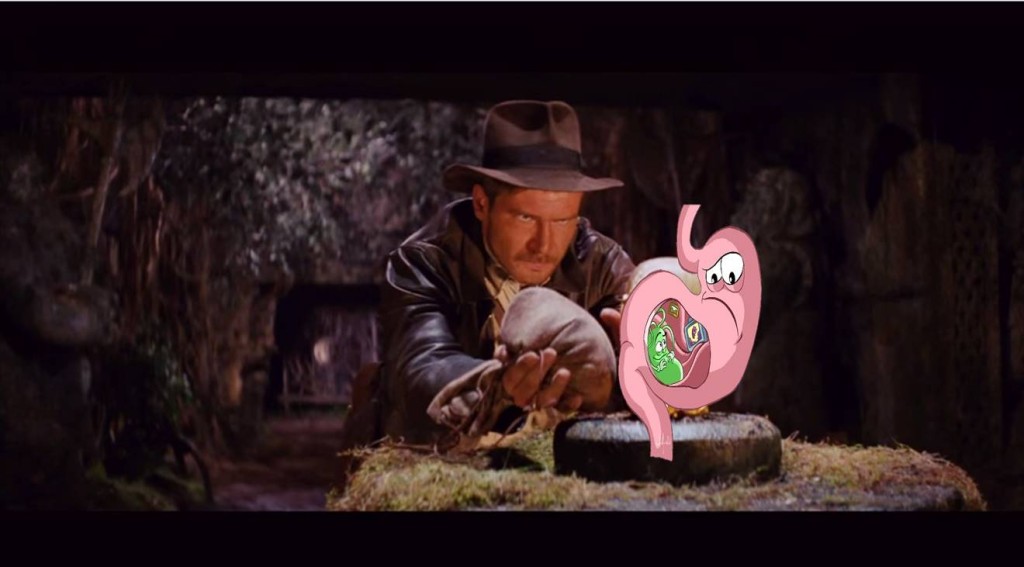The letter U has been bugging me and over the last several days, I have written and then deleted thousands of words about all sorts of things. The unexpected was a good thought, but I really already hammered that point home when I first started writing last fall. Ululation is what came to mind when I made my initial list, but pretty much all I had to say about that was, “Dang, that’s an excellent way to express strong emotions. Like the whistle on a tea kettle… got to have a way to release the steam…” and then I realized I’d pretty much already done that before, too. And I had already written about Unicorns back in January. Too bad, too, because I feel like I could have gone the Voldemort direction with that…
But then last night, just as I was drifting off to sleep, the story of Nobel Laureates Robin Warren and Barry Marshall popped into my head. (And then I emailed myself a sleepy and disjointed message that I’m now trying to decipher…) Warren and Marshall won the Nobel Prize in Physiology or Medicine in 2005 for demonstrating that peptic ulcers, previously attributed to type A personalities and high levels of stress, were actually an infectious disease resulting from gastric colonization with the bacterium Helicobacter pylori. (So… you count sheep, I count microorganisms. It’s whatever.)
I thought about those ulcers and I thought about all those people for all those years who felt so sick and then felt even worse because they thought it was their own fault– if only I could calm down! Relax a bit! Then I would get better.
Turns out, a prolonged course of antibiotics probably would have been about the only thing to do the trick. I wonder how that felt– good to know it wasn’t your own fault? Sucky that you felt like it was for so long?
And yet, ulcer sufferers aren’t the only group of patients to have blame placed squarely on their own shoulders. Many other disease sufferers are seen the same way– tummy troubles? Unless you can get a diagnosis of Crohn’s or celiac disease, you end up in the IBS catchall and if you could just eat better, reduce your stress, whatever, you’d be fine. Mental illness too… unless you’ve suffered from one, there’s just no way to know what it’s like and we have very little understanding of why. But truly, I can imagine nothing worse than fibromyalgia or chronic fatigue syndrome or any other number of exceptionally difficult to diagnose autoimmune and rheumatological disorders… throw in the fact that women are much more likely to suffer than men and we recognize quickly why the term “hysterectomy” was coined (because women needed all their lady bits removed to cure hysteria…. I’m not even kidding… feel free to rage, I’ll wait…).
Once upon a time, Antonie van Leeweunhoek looked through his homegrown microscope to observe what he called “animalcules” that later proved to be the agent of infectious disease. (Note: I really liked the book Microbe Hunters. It’s an over-dramatized, yet accurate, story of the history of microbiology and very engrossing if you’re into that sort of thing.) Eventually, we as a society stopped believing in humors, airs, and miasmas and started recognizing the reality that was contagion. Today, researchers work tirelessly to investigate pathways of cause and effect; to uncover the mechanism behind the diseases we still don’t understand. And someday, I have to believe the blame will end up in the right place… that is to say, off the sufferer’s shoulders.
But what about societal ailments?
Those are a little tougher… tougher to recognize. Tougher to understand. Tougher to cure.
What do I mean by societal ailments?
Things like obesity and fat-shaming.
Things like racial intolerance and categorizing young black men as thugs.
Things like blaming a woman for her own rape because of the clothes she was wearing.
Things like assuming homelessness is self-inflicted.
These things have causes too. Some personal, most not. Personal accountability is important, of course, but ultimately, the causes are insanely complex. Insidious. Difficult to pinpoint and even more difficult to comprehend.
I have, of course, a million thoughts on the above examples. I’m sure you do too. The point I think it’s really important to make here, though, is that all of these things are a little more like ulcers than we may realize.
You see, even the cause and effect of H. pylori infection and gastric ulcer is subject to mitigating circumstances. Approximately 80% of the world is estimated to be colonized by H. pylori, yet far fewer people than that actually ever have overt symptoms of disease, be it gastritis, ulcer, or cancer. Many other factors play a role, things we still don’t completely understand (although, guys, my friend, Dr. Jones from Indiana (I am not even kidding!) made major strides in figuring out some of those factors).

We can’t control the world we grow up in anymore than we can control the microorganisms that colonize our body or the genes our cells express. So maybe, just maybe, we can stop blaming each other… stop blaming ourselves for every little thing, and look to the humble ulcer as an example of why.
This should have been the first thing I said, but dang: NERD ALERT!!!